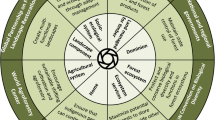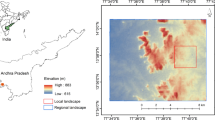Abstract
Common property arrangements govern the subsistence harvest of berries in the Gwich’in region of the Northwest Territories, Canada. Some of these arrangements, including rules for resource access, sharing information and harvest sharing, enable the Gwich’in to deal with ecological variability. The rules change in response to year-to-year variations in the abundance and distribution of the species, spatially and temporally across the region. This paper illustrates the interrelationships between ecosystem dynamics and local institutions, a neglected area of commons research.




Similar content being viewed by others
References
Andre, A., and Fehr, A. (2001). Gwich’in Ethnobotany: Plants used by the Gwich’in for Food, Medicine, Shelter and Tools, Gwich’in Social and Cultural Institute and Aurora Research Institute, Tsiigehtchic, NT.
Berkes, F. (1977). Fishery resource use in a sub-arctic Indian community. Human Ecology 5: 289–307.
Berkes, F. (1986). Common property resources and hunting territories. Anthropologica 28: 145–162.
Berkes, F., Colding, J., and Folke, C. (2000). Rediscovery of traditional ecological knowledge as adaptive management. Ecological Applications 10: 1251–1262.
Berkes, F., Colding, J., and Folke, C. (eds.) (2003). Navigating Social–Ecological Systems: Building Resilience for Complexity and Change, Cambridge University Press, Cambridge.
Chambers, R. (1994). Participatory rural appraisal (PRA): Challenges, potentials and paradigms. World Development 22(10): 1437–1454.
Davidson-Hunt, I. J., and Berkes, F. (2003). Learning as You Journey: Anishinaabe Perception of Social–Ecological Environments and Adaptive Learning. Conservation Ecology 8(1): 5. http://www.ecologyandsociety.org/vol8/iss1/art5/index.html.
Dolsak, N., and Ostrom, E. (eds.) (2003). The Commons in the New Millennium: Challenges and Adaptations, MIT, Cambridge, Massachusetts.
Dyson-Hudson, R., and Smith, E. A. (1978). Human territoriality: an ecological reassessment. American Anthropologist 80: 21–41.
Eerkens, J. W. (1999). Common pool resources, buffer zones and jointly owned territories: Hunter–gatherer land and resource tenure in Fort Irwin, Southeastern California. Human Ecology 27(2): 297–317.
Feeny, D., Berkes, F., McCay, B. J., and Acheson, J. M. (1990). The tragedy of the commons: Twenty-two years later. Human Ecology 18: 1–19.
Fratkin, E. (1986). Stability and resilience in East African pastoralism: The Rendille and the Arial of Northern Kenya. Human Ecology 14: 269–286.
Friere, P. (1973). Education for Critical Consciousness, Seabury, New York.
Gadgil, M., Hamman, N. S., and Reddy, B. M. (1998). People, refugia and resilience. In Berkes, F., and Folke, C. (eds.), Linking Social and Ecological Systems, Cambridge University Press, Cambridge.
Hardin, G. (1968). The tragedy of the commons. Science 162: 1243–1248.
Heime, M., Andre, A., Kritsch, I., and Cardinal, A. (2001). Gwichya Gwich’in Googwandak: The History and Stories of the Gwichya Gwich’in, Gwich’in Social and Cultural Institute, Tsiigehtchic, NT.
Johnson, B. (1999). Introduction to the special feature: adaptive management—scientifically sound, socially challenged? Conservation Ecology 3(1): 10. http://www.ecologyandsociety.org/vol3/iss1/art10/.
Johnson-Gottesfeld, L. (1994). Aboriginal burning for vegetation management in Northwest British Columbia. Human Ecology 22(2): 171–188.
Johnson-Gottesfeld, L. (1995). The role of plant foods in traditional Wet’suwet’en nutrition. Ecology and Nutrition 34: 149–169.
Levi-Strauss, C. (1962). The Savage Mind, University of Chicago, Chicago.
Mackenzie, A. (1801). Voyages from Montreal [...] to the Frozen and Pacific Oceans; In the years 1789 and 1793, National Library of Canada, Ottawa.
Marles, R. Clavelle, C., Monteleone, L., Tays, N., and Burns, D. (2000). Aboriginal Plant Use in Canada’s Northwest Boreal Forest, University of British Columbia, Vancouver.
McCay, B. J., and Acheson, J. M. (1987). A Question of the Commons, University of Arizona, Tucson.
Murray, G., and Boxall, P. (2002). The Distribution, Abundance and Utilization of Wild Fruits by the Gwich’in in the Mackenzie River Delta. (SFMN Project Report 2002–7), Sustainable Forest Management Network, Edmonton.
Ostrom, E. (1990). Governing the Commons: The Evolution of Institutions for Collective Action, Cambridge University Press, Cambridge.
Parlee, B., Manseau, M., and Lutsel K’e Dene First Nation. (2005a). Using traditional knowledge to address uncertainty: Denesoline monitoring of caribou movements. Arctic 58(1).
Parlee, B., Manseau, M., and Lutsel K’e Dene First Nation. (2005b). Understanding and communicating about ecological change: Denesoline Indicators of ecosystem health. In Berkes, F., Huebert, R., Fast, H., Manseau, M., and Diduck, A. (eds.), Breaking Ice: Integrated Ocean Management in the Canadian North, University of Calgary, Calgary.
Ridington, R. (1990). Little Bit Know Something (Inkonze)—Stories in a Language of Anthropology, Douglas and McIntyre, Vancouver.
Roots, F. (1998). Inclusion of different knowledge systems in research. Terra Borealis 1: 42–49.
Smith, J. G. E. (1978). Economic uncertainty in an original affluent society: Caribou and Caribou Eater Chipewyan adaptive strategies. Arctic Anthropology 15(1): 68–87.
Turner, N., and Davis, A. (1993). When everything was scarce’: the role of plants as famine foods in northwestern North America. Journal of Ethnobiology 13(2): 1–28.
Acknowledgments
The authors would like to thank the community researcher, Christine Firth; Teetl’it Gwich’in women from Fort McPherson; members of the Teetl’it Gwich’in Renewable Resources Council; Gwich’in Renewable Resources Board; and the Gwich’in Social and Cultural Institute. Special thanks to Peter Clarkson, Ingrid Kritsch, Janet Winbourne, and Pippa Hett-Seccombe. The research was funded by the Sustainable Forest Management Network and supported by the Gwich’in Renewable Resource Board. Parlee also received support from a University of Manitoba Doctoral Research Fellowship and from the Northern Scientific Training Program (NSTP). Berkes’ work was also supported by the Social Sciences and Humanities Research Council of Canada (SSHRC) and the Canada Research Chairs (CRC) program.
Author information
Authors and Affiliations
Consortia
Corresponding author
Additional information
An erratum to this article can be found at http://dx.doi.org/10.1007/s10745-006-9061-x
Rights and permissions
About this article
Cite this article
Teetl’it Gwich’in Renewable Resources Council., Parlee, B., Berkes, F. et al. Indigenous Knowledge of Ecological Variability and Commons Management: A Case Study on Berry Harvesting from Northern Canada. Hum Ecol 34, 515–528 (2006). https://doi.org/10.1007/s10745-006-9038-9
Published:
Issue Date:
DOI: https://doi.org/10.1007/s10745-006-9038-9




